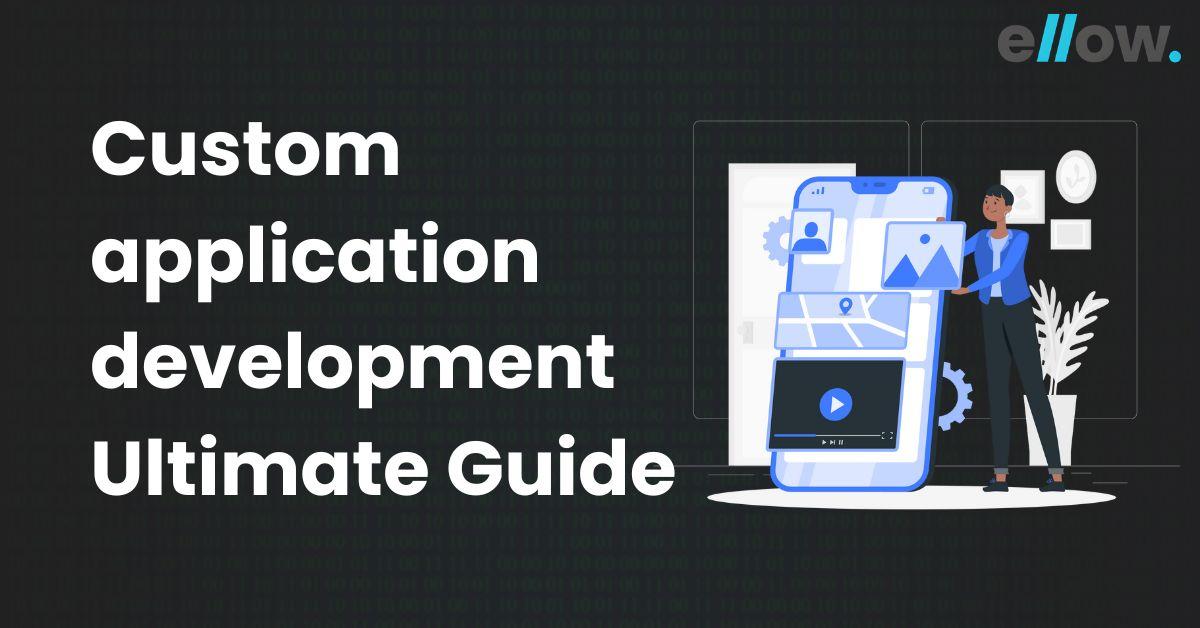
Blog
Custom Application Development Ultimate Guide

In the ever changing world of technology, startups are always looking for ways to stand out from the competition and streamline their business operations.
With so many off-the-shelf software applications available in the market, it’s no surprise that companies often find it difficult to find the perfect application for their specific needs.
The struggle is real, and we’ve all been there trying to fit a square peg into a round hole.
One big issue with ready-made applications is that they’re made for everyone, and while they can be useful, they often miss the specific functions your team really needs.
But what if there was a way to solve this problem that could save us time and money?
Introducing Custom application development.
Custom application development is the process of designing, building, and maintaining tailor-made software applications that cater specifically to business requirements.
In this ultimate guide, we’ll look at everything you need to know about custom application development and how it can solve your unique business problems.
Discover the potential of custom application development for your business with this guide.
Let’s get started.
Table of Contents
What are custom apps?

Custom apps are basically apps made specifically to fit certain needs, requirements, or tastes.
They’re not like the usual, ordinary apps you find in app stores.
These are specially crafted for a particular purpose, making them unique.
And these custom applications are typically build from the ground up, utilizing programming languages like Java, C#, and Python with frameworks like React, Angular, Vue.js, and .Net Core for a more streamlined process
Why are custom apps made?
There are a ton of reasons.
Sometimes, businesses want an app that does something super specific for their operations.
Other times, a group of folks might have a cool idea for an app that doesn’t exist yet.
So, they make a custom app to bring their idea to life.
Custom apps can boost productivity and simplify processes.
Let me give you some examples of where custom apps can come in handy.
Picture yourself owning a pizza place, and you want an app where customers can build their own pizza with tons of toppings and then order it.
That’s a perfect use case for a custom app!
Or let’s say you’re a real estate agent who needs an app to show off your listings with all the right details and filters—another awesome reason to go custom.
The possibilities are practically endless!
To sum it up, custom apps are all about creating one-of-a-kind solutions that cater to specific needs.
They can make life easier and more efficient for businesses.
What is custom application development?
Custom application development is the process of designing, building, and deploying software that is tailor-made to meet the specific needs of a business or user.
Instead of settling for a generic off-the-shelf application that might not fulfill the requirements, custom app development offers a tailor-made solution.
Let’s take Netflix’s recommendation system as an example of a custom-developed application.

Netflix’s awesome system uses complex algorithms to analyze how users behave, what they’ve watched in the past, and how they’ve rated content.
It then suggests movies and shows that match their tastes. How cool, right?
Netflix has designed and built this recommendation system specifically to meet their specific needs, playing an important role in their business model.
And guess what?
This recommendation system has been a total game-changer for Netflix.
It’s estimated that a whopping 75% of what users watch on Netflix comes from those awesome recommendations.
So not only does the custom app enhance the user experience by offering personalized suggestions, but it also keeps users engaged and hooked, which is super important for Netflix’s success.
To put it simply, custom application development is an amazing solution because it allows businesses to create applications that meet their specific needs, much like Netflix’s recommendation system does.
Benefits of custom application development
Developing custom applications has a lot of benefits for businesses.
The following are some of the benefits and advantages of custom application development:
- Tailor-made Solution
- Scalability
- Integration
- Security
- Cost-effective
- Competitive advantage
Tailor-made Solution
Custom applications address the unique needs of a business.
For example, a restaurant may require a custom application that seamlessly integrates table booking, order management, and customer feedback systems.
Generic software may not be able to provide all these solutions in one application.
Scalability
Custom applications are more scalable than packaged software. As your business grows, your custom app can be modified and scaled up accordingly.
We at Ellow have a talent pool of experienced and talented developers who can scale any application with ease.
Integration
Custom apps can be designed to integrate with existing systems or some other application.
Suppose a retail store already uses software for inventory management. A custom e-commerce application can be developed to integrate with this existing system, ensuring consistent data across all platforms.
Security
Custom software provides superior security compared to commercial applications. As it is developed exclusively for a single company, it’s less prone to cyber attacks. You can also implement advanced security measures to ensure your app’s safety.
Cost-effective in the Long Run
Despite the initial cost of developing a custom application, it can be cheaper in the long run than off-the-shelf software.
Custom apps that you build yourself don’t require ongoing subscription monthly or yearly fees and can be maintained and updated based on your business timeline and budget.
Competitive Advantage
By providing unique services or efficiencies, custom applications can give businesses a competitive advantage.
A good example of a company gaining a competitive advantage through a custom application is Domino’s Pizza.
In the late 2000s, the company noticed a shift in customer behavior toward digital ordering as everyone ordered things online. Responding to this trend, Domino’s decided to invest heavily in its digital transformation.
It developed a custom application that allowed customers to order pizzas directly from their smartphones. But Domino’s didn’t stop there.
They incorporated innovative features like the “Pizza Tracker“, which allowed customers to track their delivery in real-time.
By developing this custom application tailored to their customers’ needs, Domino’s not only improved its business processes but also gained a competitive edge over other traditional pizza delivery companies that were slower to embrace digital ordering.
Differences between custom app development and conventional app development
Conventional App Development usually refers to the process of creating an application using standard or pre-built features, templates, and frameworks. This approach often results in a generic app that can be used across various industries or for different purposes.
For example, many off-the-shelf project management apps are developed this way. They have a set of basic features, such as task management, team collaboration, and progress tracking, which can be used by any business, regardless of the industry.
Custom App Development, on the other hand, involves building an application from scratch, tailor-made for a specific business or purpose. Every feature, function, and interface is designed to fit the unique needs of a specific client or business.
For instance, an app developed for a healthcare provider might include features like appointment scheduling, patient record management, and telemedicine support, which are specifically designed to cater to the healthcare sector.
To sum up, the choice between custom and conventional app development often depends on your specific needs, budget, and long-term business goals.
While conventional app development can offer quick and cost-effective solutions, custom app development provides a higher degree of personalization and scalability.
How to build custom applications?
Building custom apps from scratch can be a thrilling and rewarding process, yet it’s also quite challenging.
Here’s a step-by-step guide to walk you through the process of building custom apps:
Step 1: Identify the Problem and Define the End-User
Every app starts with a problem that needs to be solved. Your first step is to identify the problem your app will solve.
For instance, a manufacturing firm might have issues tracking the real-time status of inventory, leading to overstocking or under-stocking situations.
Once you’ve identified the problem, it’s crucial to understand who your target audience is. Knowing who will use your app helps you to design it in a way that best suits their needs and preferences.
Step 2: Plan Your App
In this stage, you’ll need to sketch out your ideas and plan how the app will work.
This includes defining the features your app will have and how the user will navigate through the app.
Step 3: Design and prototype your app

Design is one of the most important parts of the app development process.
According to a 2022 report by Statista, 38% of users uninstall apps because of poor user experience.
The design phase typically starts with creating wireframes and prototypes, representing the app’s layout and functionality.
For example, a healthcare app may start with a wireframe showing the patient’s login, appointment booking, and medical record access.
You can use design tools like Adobe XD, Sketch, or Figma for this. These tools allow you to create interactive designs and mockups with no coding.
Step 4: Selecting the Right Technology Stack
Choosing the appropriate technology stack is a critical step in custom application development.
This involves evaluating different programming languages, frameworks, and tools.
For instance, Python with Django might be ideal for a data-intensive application, while JavaScript with React could be more suitable for a highly interactive web application.
The selected technologies should also ensure compatibility and performance.
Step 5: Test and deploy your App
Once you’re satisfied with your design and selected technology stack, you can start coding the app.
The development stage involves coding the application, either by an internal team of developers or by hiring developers from a talent cloud like Ellow.
Testing is also a vital component of custom application development.
It involves rigorous quality assurance to ensure the app works as expected and provides an optimal user experience.
Feedback from beta testers or early adopters can be invaluable in this stage.
For instance, users might suggest that a navigation feature in an e-commerce app is not intuitive, leading to improvements before the final release.
Post testing, the app is deployed, or launched, for end users.
Step 6: Optimize and Update
After your app goes live, your work is still not done. You’ll need to monitor how your app is doing, gather user feedback, and make updates as necessary.
Create custom apps using Ellow's Pre-vetted developers
Leverage Ellow’s pre-vetted developers for streamlined custom app development. Our rigorous vetting focuses on technical and soft skills, ensuring a swift hiring process for your unique needs.
Speed up your market entry and gain a competitive edge with effective and quality developers from Ellow. Turn your digital aspirations into reality in a timely and efficient manner.
Suvankar Das
Suvankar Das
Recent posts


How AI Is Changing the Game for Developer Hiring






